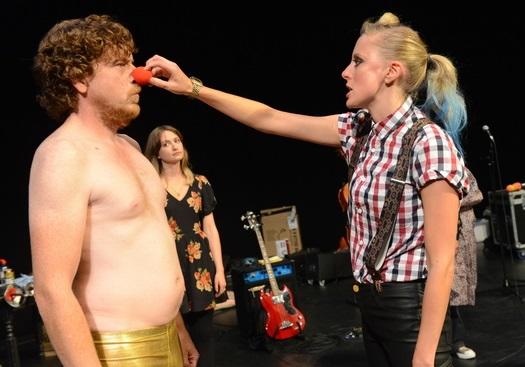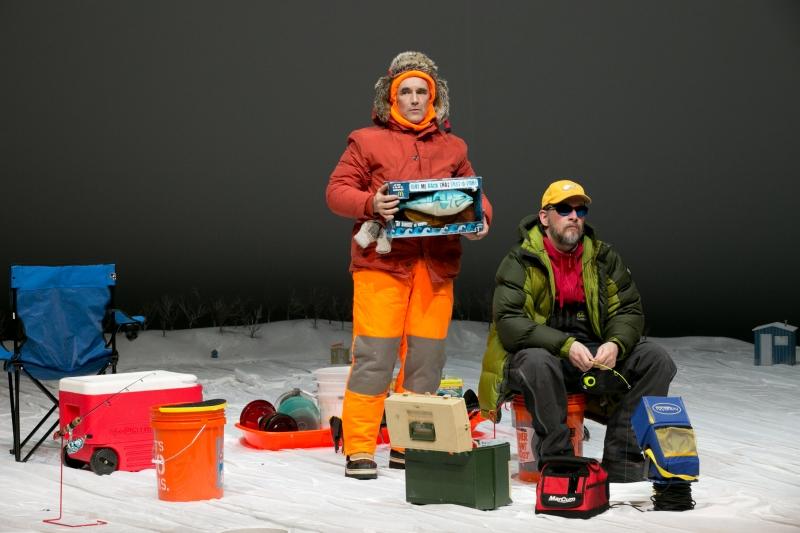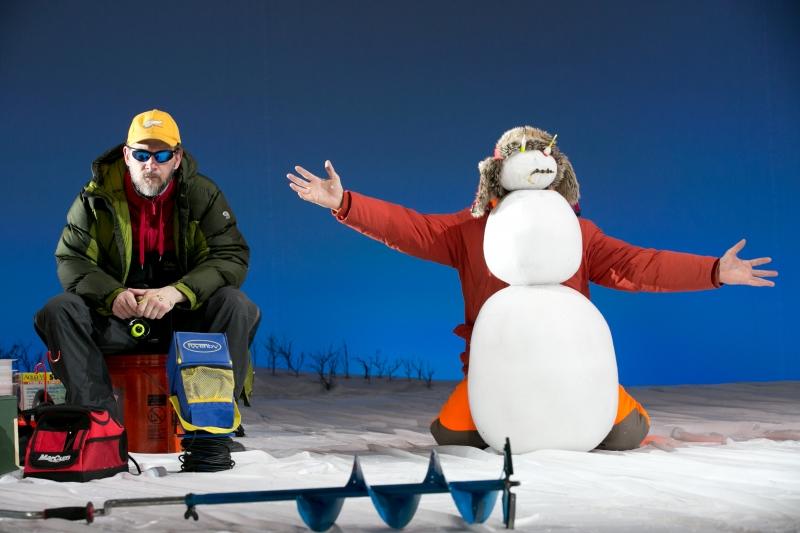Mark Rylance has been widely hailed as “the greatest stage actor of his generation,” but he’s only recently become familiar to screen audiences – first as the quietly devious Thomas Cromwell in the BBC miniseries Wolf Hall, based on Hilary Mantel’s two-volume blockbuster, and then as the quietly imperturbable Rudolf Abel in Spielberg’s Bridge of Spies.
Now he’s back onstage in a quietly poetic little play called Nice Fish, which plays through this week at the American Repertory Theater in Cambridge. The 95-minute piece is “drawn from the words of” Minnesotan poet Louis Jenkins, and takes place around a couple of ice-fishing holes far out on frozen Lake Superior. Rylance and Jenkins have paged through 450 of Jenkins’ prose poems to stitch together a loose, charming sequence of deadpan exchanges, reminiscences and reveries.
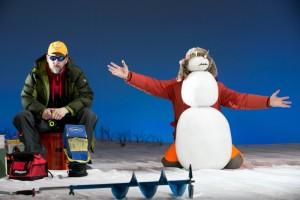 Two middle-aged friends from high school, Ron and Erik (Rylance and Jim Lichtscheidl), are engaged in a tentative reunion out on the ice. Erik is task-oriented and tech-savvy, intent on catching one big one before the ice melts. Ron is dreamy and whimsical, amusing himself with little jokes and games, including a hilarious ventriloquist act with a snowman. Their routines, punctuated by blackouts, have the feel of a vaudevillian Waiting for Godot.
Two middle-aged friends from high school, Ron and Erik (Rylance and Jim Lichtscheidl), are engaged in a tentative reunion out on the ice. Erik is task-oriented and tech-savvy, intent on catching one big one before the ice melts. Ron is dreamy and whimsical, amusing himself with little jokes and games, including a hilarious ventriloquist act with a snowman. Their routines, punctuated by blackouts, have the feel of a vaudevillian Waiting for Godot.
They’re interrupted by an officer of the Department of Natural Resources (Bob Davis) who is all about fishing permits, and later on joined by a chatty southerner (Kayli Carter), a kind of ice princess named Flo (get it? floe?) whose fishing hut has a sauna. Jenkins is also in the cast, pretty much as a version of himself, the bearded, laconic North Country bard. (It didn’t surprise me to learn he’s a frequent guest on A Prairie Home Companion.)
As the day wanes into a dark-blue dusk, the conversations grow progressively metaphysical, from meditations on life’s little perils and adventures to its Big Questions. Fishing has often (too often) served metaphorical ends, and here, with two guys dangling thin lines into the dark water in hopes of catching hold of something, ice fishing fulfills that purpose, with the added symbol of the ice itself: What we know, what we experience, is balanced on the thin, fragile surface of life’s unfathomable depths. Todd Rosenthal’s set, a sheet of ice suspended over the stage and strewn with camping gear and with tiny houses visible on the far shore, is itself a metaphor for the play’s metaphor.
 In a post-show talkback, Rylance was asked the inevitable question, “As an actor, which do you prefer, stage or screen?” He compared the two to the games of rugby and American football. Working in film and TV is like football, a constant stop-and-go, whereas once a rugby match begins, it’s nonstop for 80 minutes with an intermission.
In a post-show talkback, Rylance was asked the inevitable question, “As an actor, which do you prefer, stage or screen?” He compared the two to the games of rugby and American football. Working in film and TV is like football, a constant stop-and-go, whereas once a rugby match begins, it’s nonstop for 80 minutes with an intermission.
After giving credit to the distinct rewards of each medium, he then plumped firmly for the theater. In film, he said, the actor has no control over the storytelling, which is all done in the editing room. In the theater, though, “there’s the sense of connection with a live audience, and their response shapes the performance.”
The last time I saw Rylance on stage was in the Globe Theatre’s all-male “original practices” production of Twelfth Night, where he unforgettably played the prim but passionate Countess Olivia. As it happened, on the same day I attended Nice Fish, I saw another, wildly different performance of that play.
Out of all of Shakespeare’s works, Twelfth Night is the one most susceptible to fun and games. Which makes sense: The subtitle is “What You Will” and the title refers to the post-Christmas holiday marked by topsy-turvy celebration and misrule.
It also has the silliest plot of all the comedies: the girl who’s disguised as a boy who’s in love with her boss who’s in love with the woman who’s in love with the girl who’s disguised as a boy, plus a clownish crew composed of a tipsy oaf, a crafty maidservant, an upper-class twit and an actual clown, all of them plotting to humiliate the puritanical steward who’s in love with the woman who’s in love with…. You get the picture.
So does Filter Theatre, the English troupe chosen by the Royal Shakespeare Company to stage the play as part of the RSC’s Complete Works cycle ten years ago. It’s now on tour, and the recent ten-day stand at ArtsEmerson in Boston confirmed the company’s reputation for “playful, kaleidoscopic” productions that gleefully upend conventions.
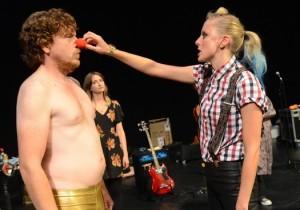 Their madcap, 90-minute Twelfth Night fields a cast of six actors in modern dress (with one Elizabethan exception), two musicians and an onstage, participating stage manager. All of them wield musical instruments and/or electronic sound effects. Most of them play more than one role, in addition to themselves. Everyone’s onstage the whole time, there’s no set, and the show not only demolishes the conventional “fourth wall” between audience and performers, but makes the auditorium itself – houselights on throughout – part of the stage.
Their madcap, 90-minute Twelfth Night fields a cast of six actors in modern dress (with one Elizabethan exception), two musicians and an onstage, participating stage manager. All of them wield musical instruments and/or electronic sound effects. Most of them play more than one role, in addition to themselves. Everyone’s onstage the whole time, there’s no set, and the show not only demolishes the conventional “fourth wall” between audience and performers, but makes the auditorium itself – houselights on throughout – part of the stage.
The “we’re all in this together” mood prevails from the outset, when one of the actors, Harry Jardine, points out the exits and does the no-cellphone request, to the moment when Sandy Foster borrows a man’s coat and hat from the audience in order to become the girl disguised as a boy, to the audience-participation spongeball-throwing contest and the pizza delivery.
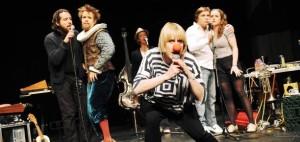 Add to this, the sudden explosions of rock’n’roll that punctuate the foolery and oddly complement the text. Indeed, the company’s trademark is its ingenious, subversive use of music and sound, exemplified here when a character holds a microphone against her head and we hear the music inside – followed by drunken Toby Belch doing the same and getting static.
Add to this, the sudden explosions of rock’n’roll that punctuate the foolery and oddly complement the text. Indeed, the company’s trademark is its ingenious, subversive use of music and sound, exemplified here when a character holds a microphone against her head and we hear the music inside – followed by drunken Toby Belch doing the same and getting static.
And where is Shakespeare’s play in all this? It’s there, in ruthlessly condensed form, but performed, when a scene is allowed to fully unfold, with feeling and skill. I wasn’t entirely convinced by the juxtaposition, and missed some of the script’s subtler touches, but I delighted in the troupe’s ramshackle, ad-lib response to the title’s invitation to caprice and anarchy.
Nice Fish photo by Evgenia Eliseeva; Mark Rylance photo by Bert Brewer;
Twelfth Night photos courtesy of Filter Theatre
If you’d like to be notified of future posts, email StageStruck@crocker.com


